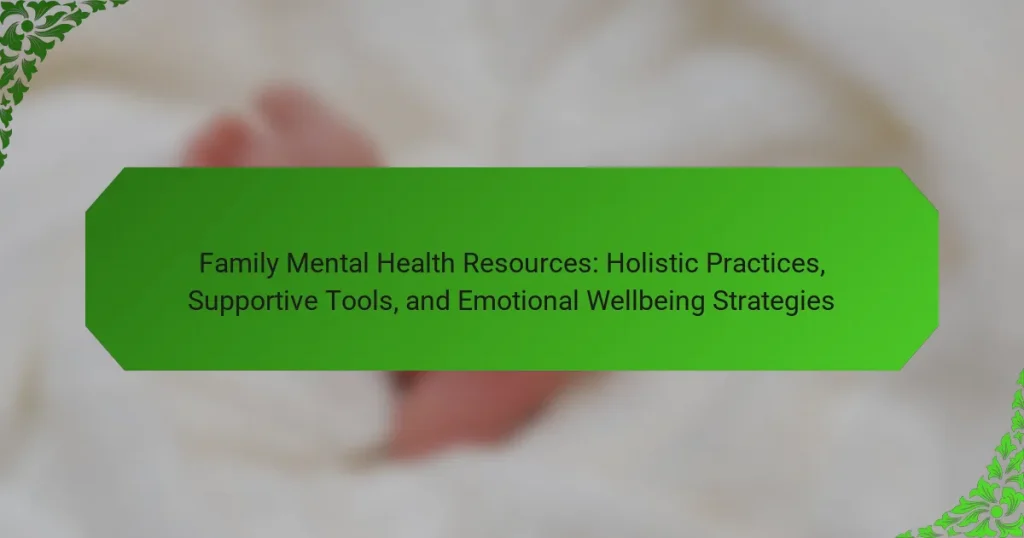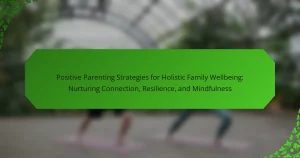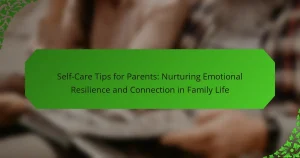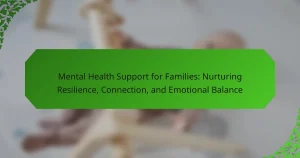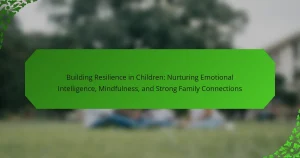Family mental health resources are crucial for fostering emotional well-being and resilience. Essential holistic practices include mindfulness, family therapy, and physical activity. Unique tools like mindfulness apps and emotional check-in games support mental health. Community programs and educational workshops provide additional support, enhancing family dynamics and communication.
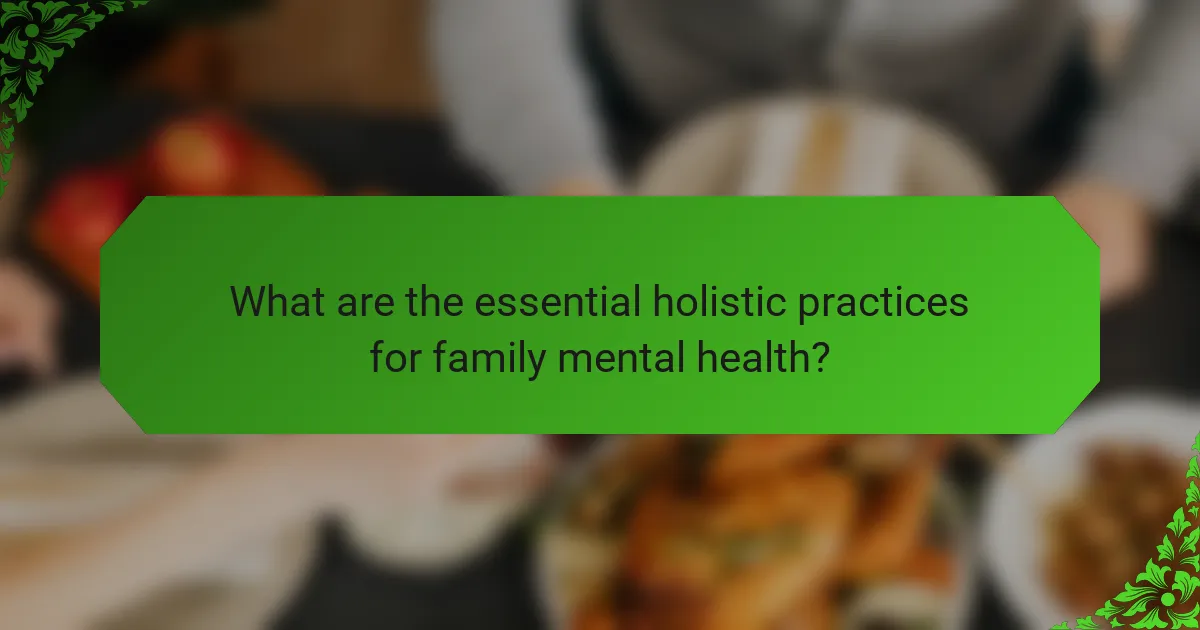
What are the essential holistic practices for family mental health?
Essential holistic practices for family mental health include mindfulness, family therapy, and physical activity. Mindfulness techniques, such as meditation, enhance emotional regulation and reduce stress. Family therapy fosters open communication, improving relationships and understanding. Regular physical activity boosts mood and overall well-being, promoting a healthier family dynamic. Incorporating these practices supports emotional resilience and strengthens family bonds.
How can mindfulness techniques enhance family emotional well-being?
Mindfulness techniques significantly enhance family emotional well-being by promoting connection and reducing stress. These practices encourage open communication, fostering a supportive environment. Regular mindfulness exercises, such as meditation or breathing techniques, can lower anxiety levels in family members. As a result, families experience improved emotional resilience and stronger relationships. Engaging in mindfulness together cultivates empathy and understanding, essential for nurturing a harmonious family dynamic.
What role does nutrition play in supporting mental health for families?
Nutrition significantly supports mental health for families by providing essential nutrients that enhance emotional well-being. A balanced diet rich in fruits, vegetables, whole grains, and lean proteins can improve mood and cognitive function. Omega-3 fatty acids, found in fish, are linked to lower rates of depression. Additionally, the gut-brain connection suggests that probiotics may influence mental health positively. Families practicing healthy eating together can strengthen relationships and create a supportive environment, promoting overall mental wellness.
Which foods are known to boost mood and cognitive function?
Foods known to boost mood and cognitive function include fatty fish, berries, dark chocolate, nuts, and leafy greens. Fatty fish, such as salmon, are rich in omega-3 fatty acids, which support brain health. Berries contain antioxidants that enhance communication between brain cells. Dark chocolate can improve mood due to its ability to release endorphins. Nuts provide essential vitamins and minerals that contribute to cognitive performance. Leafy greens are packed with nutrients that support mental clarity.
How can physical activity improve mental health outcomes for families?
Physical activity significantly improves mental health outcomes for families by reducing stress and enhancing emotional resilience. Engaging in regular exercise fosters stronger family bonds and promotes positive interactions. Studies show that physical activity can decrease anxiety and depression symptoms, creating a healthier home environment. Activities like walking, biking, or playing sports together encourage communication and teamwork, which are vital for emotional well-being.
What types of exercises are most beneficial for family bonding?
Physical activities that encourage teamwork and communication are most beneficial for family bonding. Engaging in exercises such as hiking, team sports, or dance classes fosters connection and cooperation among family members. These activities promote emotional well-being and create lasting memories. Additionally, yoga and mindfulness exercises can enhance family mental health by reducing stress and improving emotional resilience. Families that exercise together often report stronger relationships and improved communication skills.
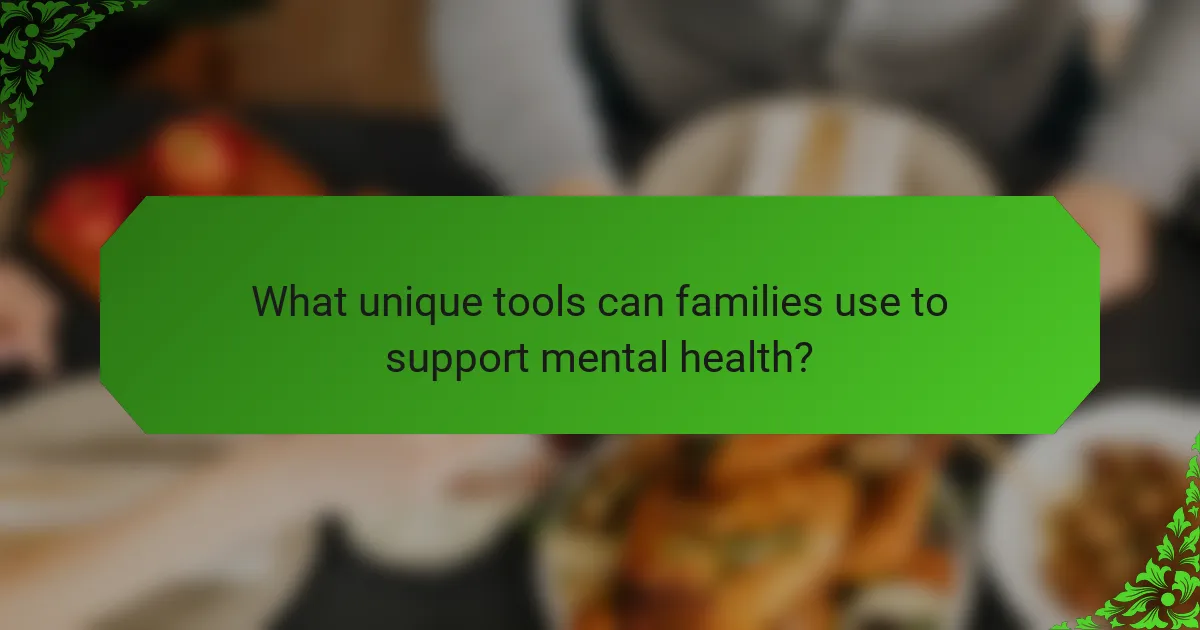
What unique tools can families use to support mental health?
Families can use unique tools like mindfulness apps, family therapy sessions, and emotional check-in games to support mental health. Mindfulness apps offer guided practices for stress reduction, enhancing emotional awareness. Family therapy sessions provide a structured environment for open communication, fostering understanding. Emotional check-in games encourage family members to express feelings, promoting emotional connection. These tools collectively enhance emotional well-being and create a supportive family environment.
How can art therapy be utilized in family settings?
Art therapy can effectively enhance family dynamics by fostering communication and emotional expression. It provides a creative outlet for family members to explore feelings, resolve conflicts, and strengthen bonds. Engaging in art therapy can improve emotional well-being, promote understanding, and facilitate healing within the family unit. Families can participate in guided sessions led by a trained therapist, using various art forms to express their experiences and emotions. As a result, art therapy serves as a unique tool for building resilience and enhancing mental health in family settings.
What are the benefits of using nature therapy for family well-being?
Nature therapy enhances family well-being by reducing stress, improving communication, and fostering emotional connections. Engaging with nature promotes mental clarity, emotional regulation, and overall family cohesion. Studies show that families participating in nature therapy report increased happiness and stronger relationships. Nature therapy also encourages physical activity, contributing to better health and resilience among family members.
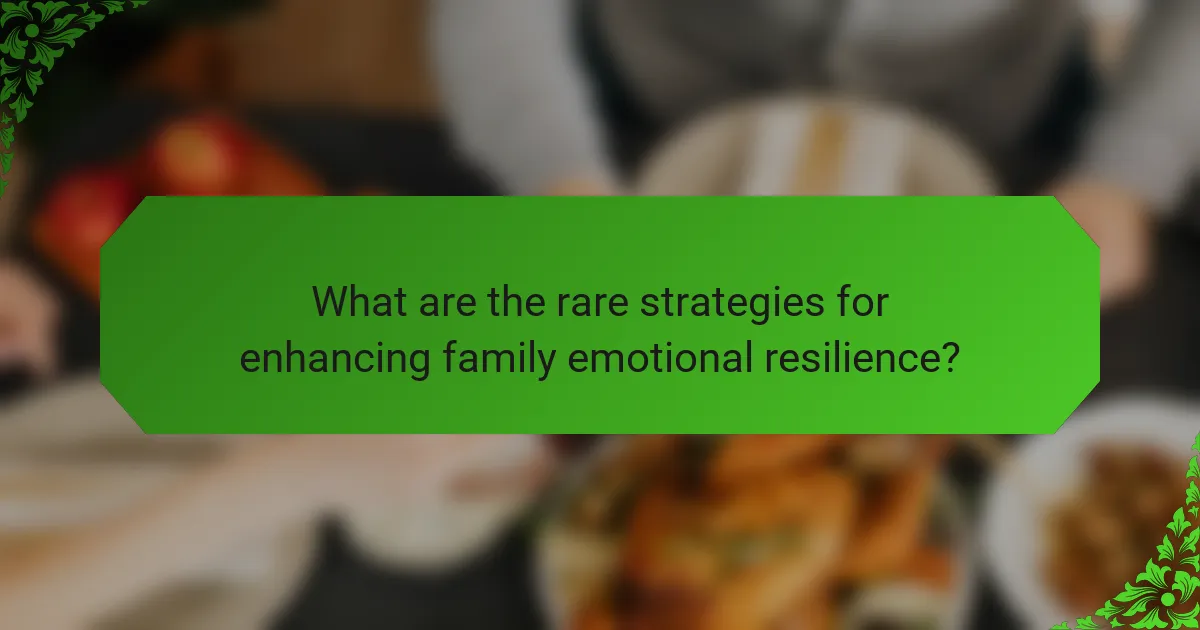
What are the rare strategies for enhancing family emotional resilience?
Rare strategies for enhancing family emotional resilience include fostering open communication, engaging in collective problem-solving, and practicing gratitude rituals. These approaches create a supportive environment that strengthens emotional bonds. Incorporating mindfulness practices as a family can also enhance awareness and reduce stress. Additionally, exploring creative outlets together, such as art or music, can deepen connections and encourage emotional expression.
How can storytelling foster emotional connections within families?
Storytelling fosters emotional connections within families by creating shared experiences and enhancing communication. Engaging narratives help family members express feelings, understand each other’s perspectives, and build empathy. This practice can lead to improved emotional well-being and resilience, as families navigate challenges together. Research indicates that storytelling can strengthen family bonds, promote mental health, and provide a supportive framework for discussing emotions. By incorporating storytelling into family routines, members can cultivate a deeper sense of belonging and connection.
What innovative approaches exist for family conflict resolution?
Innovative approaches for family conflict resolution include mediation, active listening, and family therapy. Mediation involves a neutral third party facilitating discussions to reach mutually acceptable solutions. Active listening enhances understanding and empathy among family members. Family therapy provides a structured environment for addressing underlying issues and improving communication. These strategies promote emotional well-being and strengthen family bonds.
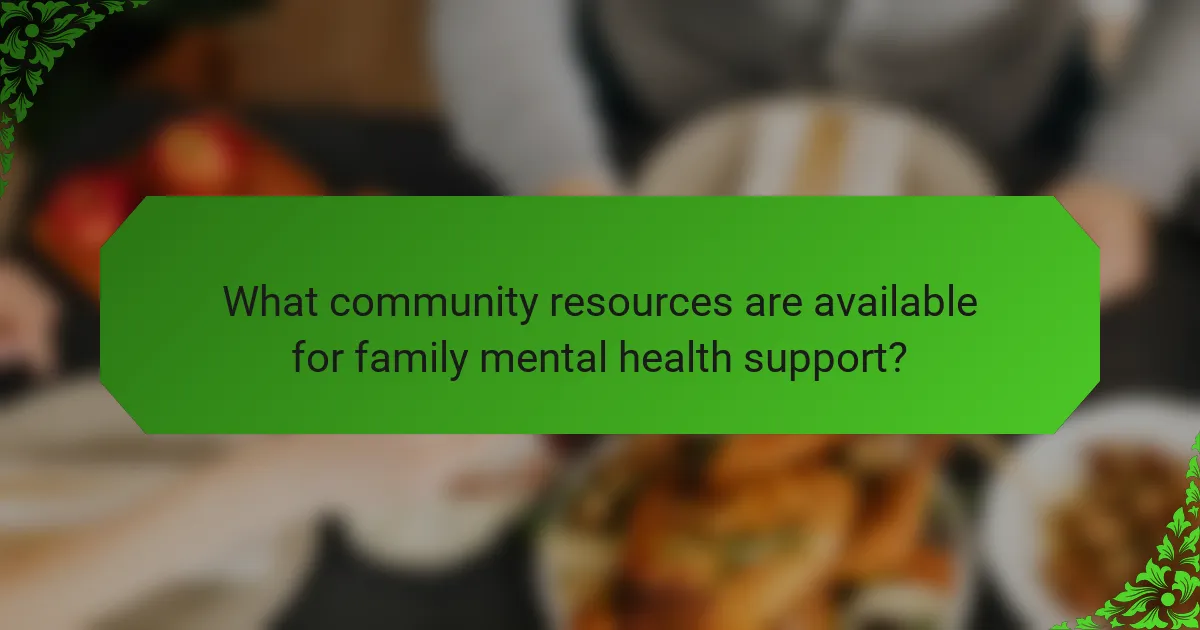
What community resources are available for family mental health support?
Family mental health support resources include community programs, therapy options, and educational workshops. Local mental health organizations often provide counseling services tailored for families. Schools may offer workshops focusing on emotional resilience and coping strategies for children and parents. Online platforms and helplines can connect families with mental health professionals for immediate support. Additionally, peer support groups foster community connections, enhancing emotional well-being through shared experiences. These resources promote holistic practices that address mental health comprehensively.
How can local organizations assist families in need of mental health resources?
Local organizations can provide essential support to families needing mental health resources through community programs, workshops, and counseling services. These initiatives foster emotional well-being and enhance access to holistic practices.
Organizations often offer peer support groups, which create safe spaces for sharing experiences and coping strategies. Additionally, they may provide educational resources that equip families with tools for managing mental health challenges.
Collaboration with mental health professionals ensures that families receive tailored guidance. This connection to experts enhances the effectiveness of local support initiatives.
By promoting awareness of available resources, local organizations empower families to seek help proactively. Increased community engagement leads to improved mental health outcomes for families in need.
What online platforms offer holistic mental health support for families?
Several online platforms offer holistic mental health support for families. These resources include BetterHelp, Talkspace, and Headspace, which provide therapy, mindfulness practices, and emotional wellness strategies.
BetterHelp offers personalized therapy sessions with licensed professionals, focusing on family dynamics and communication. Talkspace allows families to engage with therapists via text, video, or audio, promoting flexible support. Headspace provides guided meditations and mindfulness exercises tailored for family well-being.
Additionally, platforms like Calm and MyTherapy provide tools for stress management and emotional regulation. Calm features sleep stories and relaxation techniques, while MyTherapy helps families track mental health progress and medication adherence. These platforms collectively enhance emotional well-being through diverse holistic practices.
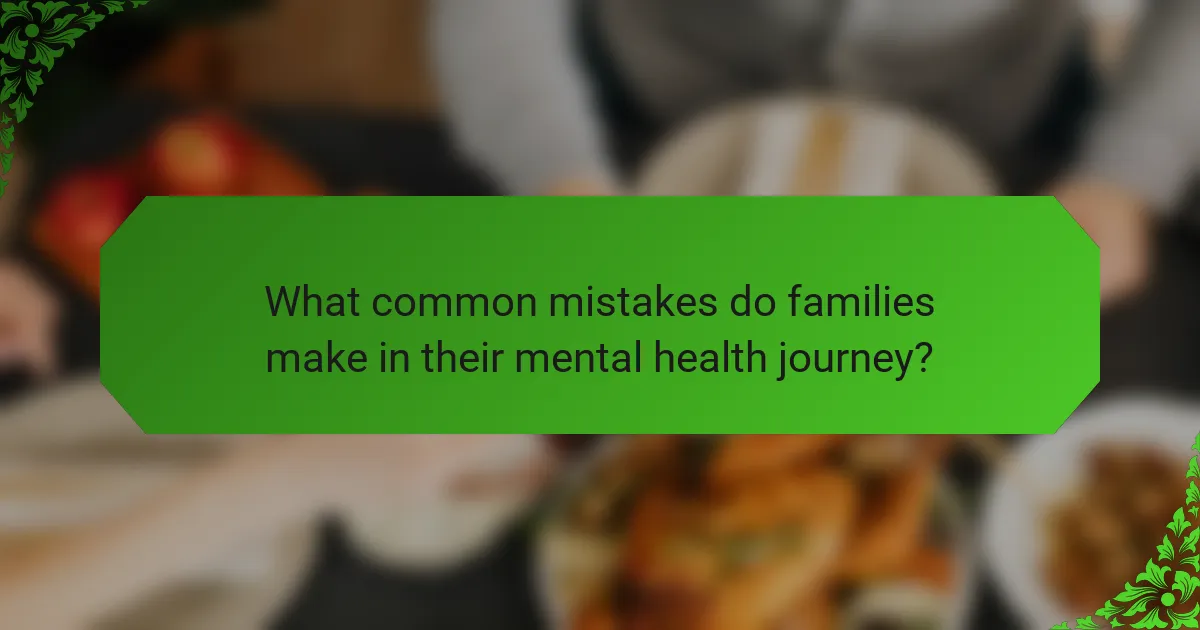
What common mistakes do families make in their mental health journey?
Families often overlook the importance of open communication in their mental health journey. Common mistakes include neglecting individual needs, prioritizing stigma over support, and failing to seek professional guidance. These missteps can hinder emotional well-being and create barriers to effective healing. Engaging in holistic practices and utilizing supportive tools can enhance family dynamics and foster resilience.
How can families avoid burnout while practicing holistic mental health strategies?
Families can avoid burnout by implementing structured holistic mental health strategies. Prioritize open communication to express feelings and concerns, fostering a supportive environment. Incorporate mindfulness practices, such as meditation or yoga, to enhance emotional resilience. Schedule regular family activities that promote connection and relaxation, like nature walks or game nights. Establish boundaries around work and technology to ensure quality family time. Utilize community resources, such as counseling or support groups, to share experiences and gain insights.
What are the best practices for maintaining consistent mental health routines?
To maintain consistent mental health routines, prioritize daily practices that promote emotional well-being. Establish a structured schedule incorporating exercise, mindfulness, and social connections.
Incorporate holistic practices such as meditation and journaling, which enhance self-awareness and reduce stress. Use supportive tools like mental health apps for tracking moods and setting reminders for breaks.
Engage family members in these routines to foster a supportive environment. Regular check-ins can strengthen emotional bonds and provide mutual encouragement.
Lastly, adapt routines based on individual needs and feedback, ensuring they remain effective and relevant over time.
What expert insights can guide families in their holistic mental health efforts?
Families can enhance their holistic mental health efforts by integrating expert insights focused on emotional well-being. Prioritize open communication to foster trust and understanding. Engage in regular family activities that promote connection, such as shared meals or outdoor exercises. Utilize mindfulness practices like meditation or yoga to reduce stress and improve emotional resilience. Seek professional guidance when necessary, ensuring access to mental health resources tailored to family dynamics. Embrace diverse support tools, including workshops or community groups, to strengthen collective mental health.
